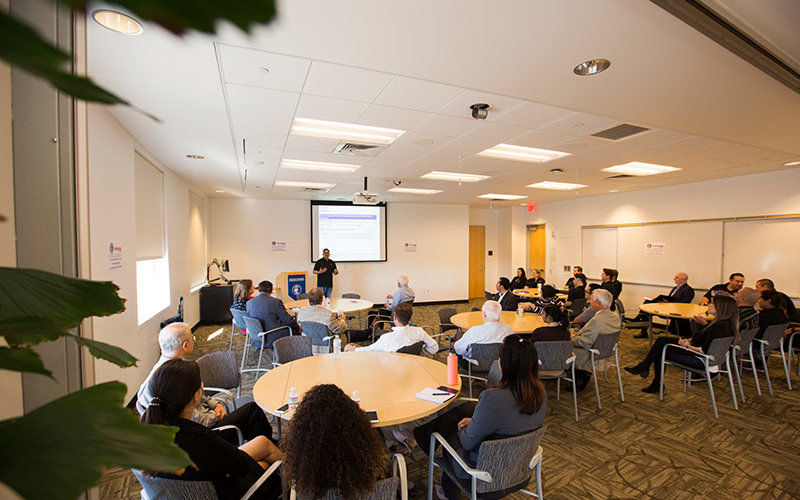
Scott O’Brien’s law enforcement and security product company, The Safariland Group, is set to save thousands of dollars in operations expenses this year, thanks to a team of Titans who spent the spring studying the company as a learning laboratory.
The Ontario company has $82 million in inventory, said O’Brien. The team of eight business students applied lean operations and supply chain management techniques in a 15-week study. Their recommendations are set to free up about 10 percent, or $8 million in cash flow for Safariland.
“There was never a doubt in my mind that the results would be good,” said O’Brien ’77 (B.A. business administration-marketing), a longtime Titan supporter. “But the results are far better than I even thought.”
The mission was to aid the company that had grown too quickly. Safariland more than doubled its sales from $200,000 to nearly $500,000 in just a few years — and its plant was exceeding capacity.
“I believe we had reached a tipping point at my company and we needed to shake it up,” O’Brien said. He jumped at the chance to gain insight from students mentored by Bob Bennett, a former head of North American operations for Toyota and current president and founder of Lean Consulting Associates, LLC.
The team of interns quickly discovered that without standard operating procedures and an efficient inventory system, employees in the Ontario center were struggling to fill orders promptly. The interns visited the Ontario site weekly and met with employees. The team’s research led them to change the warehouse layout, reorganize the inventory system, draft standard operating procedures, and implement plans modeled after the “Toyota Way” — maintaining lean inventory levels to build competitive advantage and grow the business.
Concepts the team members studied in business and management courses came to life as they worked to solve a client’s unique trouble — too much demand for inefficient supply.
“The experience was a great test,” said Dominik Dobrowolski, a senior studying business. “There’s nothing like going out there and experiencing it.”
The results included reducing late orders from 30 percent to 5 percent, cutting on-hand inventory from about 7,000 units to just a seven-day supply, and building a plan of action that allowed the company to place smaller orders more frequently and still keep up with its deliveries. The company is set to save thousands by removing obsolete items from the inventory and shrinking its lead time.
The project is valuable training for the workforce, said Gerard Beenen, chair and associate professor of management in Mihaylo College of Business and Economics. He likened the experience to being thrown in the pool to learn how to swim.
“Now you’re better for it, and now you know how to swim,” he told the group of students at a recent presentation before CSUF President Fram Virjee and Mihaylo College Dean Morteza Rahmatian in the Scott O’Brien Family Innovation Center on campus.
Mason Padjen ’18 (B.A. business administration-operations and supply chain management) landed a job as an area manager with Amazon after he explained the Safariland project during his interview.
“I talked for 10 minutes about the process and the focus, and I used a lot of terms that I had not only learned but used in the project. I don’t think I would have gotten the job without this experience,” he said.
Fellow classmate April Slattery joined the team with 15 years work experience in Britain.
“I knew I needed more experience working in the states, and I’ve learned the corporate culture is a lot different here,” she said.
O’Brien said he’ll gladly welcome another team of interns next semester, and he encourages other businesses to collaborate with student teams.
“To me it was a no-brainer,” he said. “It was a home run for the students. It was a home run for Safariland.”